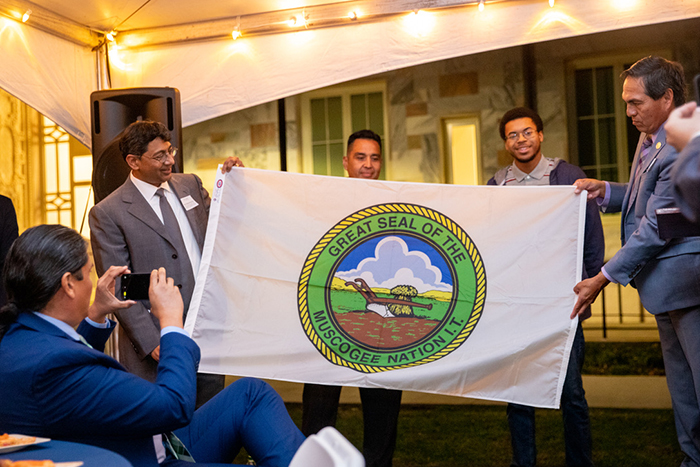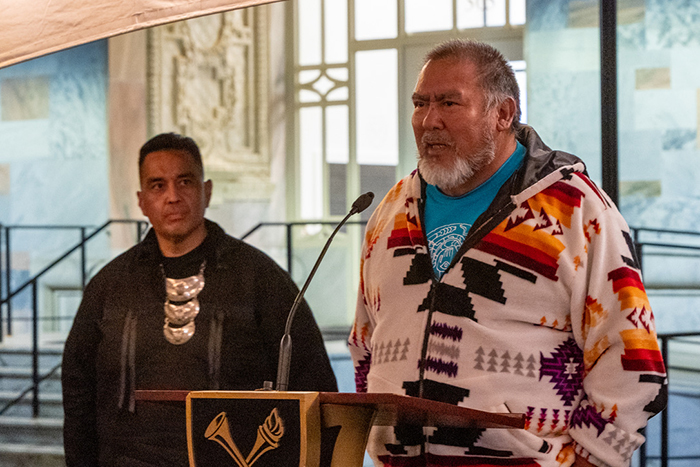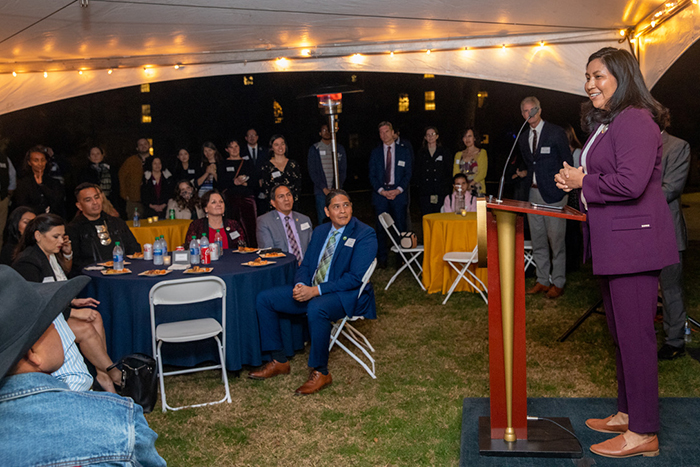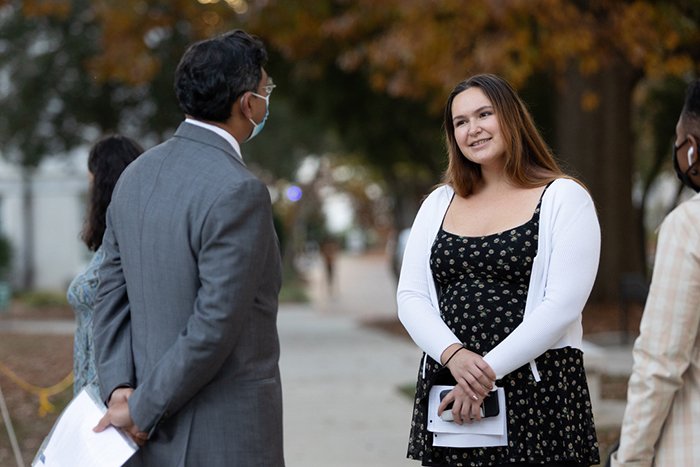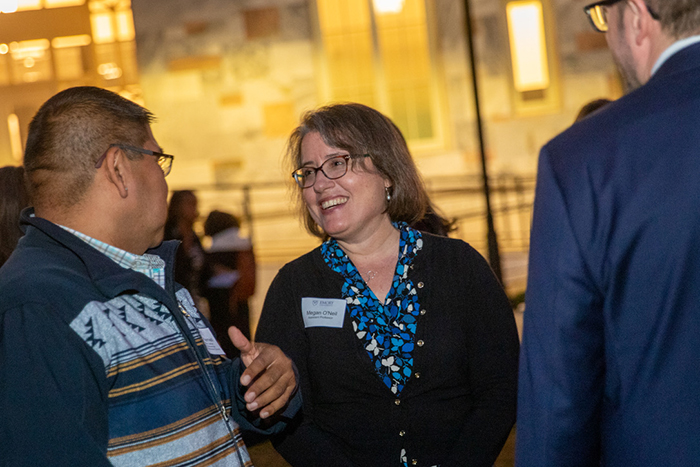Emory recently held a special reception to welcome leaders from the Muscogee (Creek) Nation to campus as an early step toward honoring the Indigenous peoples as the original inhabitants and stewards of the land on which Emory now sits.
A group of faculty, staff and students greeted the Muscogee (Creek) Nation delegation on Nov. 17 at an outdoor gathering on the quadrangle in front of Convocation Hall, one of the first buildings on Emory’s Atlanta campus, which was constructed more than a century ago.
The Muscogee (Creek) Nation delegation visit came nearly two months after Emory’s Board of Trustees approved an official Land Acknowledgment recognizing the Indigenous nations who were displaced in the years before Emory’s founding. Matowacipi Horse, a second-year student in Emory College who is a citizen of the Comanche Nation, read the Land Acknowledgment at the reception.
“Emory's motto is ‘The wise heart seeks knowledge,’” said Provost Ravi V. Bellamkonda at the event. “We have been seeking to understand and acknowledge our past. This has been some of the most important work we have been doing.”
‘The first step of many steps we will take together’
Beth Michel, associate dean of admission, is a program leader in Emory’s Native American Initiative and a Tohono O'odham Nation citizen. She noted the Muscogee Nation leaders were gathering at Emory’s campus nearly three years to the day from when the university held its Native American Student Symposium in 2018.
“[The symposium] was actually Emory positioning themselves to listen and comprehend how best to center Indigenous knowledge and support Native faculty and students,” Michel said during the reception.
Hosting the Muscogee Nation delegation “shows the commitment from Emory to invest in our Native students and grow our Native faculty here,” said Michel, who introduced the delegation at the event.
Creating partnerships with universities, especially those doing the work to acknowledge their history, is a priority to ensure opportunities for Indigenous students and educators, said Muscogee Nation Principal Chief David Hill.
Second Chief of the Muscogee Nation Del Beaver said the Nation appreciates Emory’s willingness to explore its history.
“This is not just a partnership; it’s also a part of a healing process,” Beaver told the group. “This is just the first step of many steps we will take together. I just appreciate Emory being a part of the healing process of what is sometimes a horrific story.”
Emory University was founded in Oxford, Georgia, in 1836 — 15 years after the Muscogee were forced to relinquish the land through the First Treaty of Indian Springs. “We recognize the sustained oppression, land dispossession, and involuntary removals of the Muscogee and Cherokee peoples from Georgia and the Southeast,” the university’s Land Acknowledgment states. “Emory seeks to honor the Muscogee Nation and other Indigenous caretakers of this land by humbly seeking knowledge of their histories and committing to respectful stewardship of the land.”
Bellamkonda paid homage to that history when he noted how wonderful it was to hear the language of the Muscogee (Creek) Nation spoken as part of the reception. "This land, this sky, these trees rejoice to hear the language spoken again,” he said. “It has been far too long.”
Today the Muscogee (Creek) Nation, headquartered in Okmulgee, Oklahoma, is the fourth largest tribe in the U.S., with more than 86,000 citizens.
The reception concluded with an exchange of gifts. Hill gave Bellamkonda an official Muscogee Nation flag.
The provost then presented Hill with a framed image of the Callicarpa americana plant (American Beautyberry). The plant is native to Georgia and other Southern states and was sourced by Emory medical ethnobotanist Cassandra Quave, who has researched its medicinal use by Muscogee and other Native American tribes.
“May this gift serve as a symbol of healing and hope … and as a reminder of our mutual respect for each other and for the land as a source of life and learning,” Bellamkonda said.
Emory’s commitment to learn from the Muscogee Nation
President Gregory L. Fenves announced the approval of the Land Acknowledgment in September in the lead-up to the university’s “In the Wake of Slavery and Dispossession” symposium. The symposium “highlighted the ongoing efforts and research in the areas of slavery, dispossession, and restorative justice, with a focus on the legacy of racism and its enduring effects at Emory University.”
Fenves also announced he was forming a Language Path Working Group that, building on the Task Force on Untold Stories and Disenfranchised Populations’ recommendations, would draft a Request for Proposals for landscape and other artists to design physical reminders on the Oxford and Atlanta campuses to highlight Muscogee land and knowledge in relation to the land and history.
The group is co-chaired by Malinda Maynor Lowery, Cahoon Family Professor of American History in Emory College, and the Rev. Gregory W. McGonigle, Emory’s dean of religious life and university chaplain. Other task force members include students, faculty and staff.
The Language Path Working Group is also charged with conducting research about Emory’s history and its relation to Native American and Indigenous peoples and identifying opportunities for future programming to educate the campus community.
On the evening of the Muscogee Nation leaders’ visit, after the official reception, the Language Path Working Group held its second meeting, during which they met with members of the delegation to seek their vision for the Language Path. The working group is expected to make its recommendations in May.
McGonigle said meeting with the Muscogee Nation delegation was a “crucial opportunity for our working group to hear directly from the Muscogee Nation leaders on their perspectives.”
“There was a beautiful spirit of openness and a desire to work together to envision an exciting future,” he said.
Lowery, who is a member of the Lumbee Tribe, said she feels a “keen responsibility to represent my own people well and ensure that Muscogee values are respected and honored.”
“It was a gathering that I feel launched our commitment, as expressed in the Land Acknowledgment, to steward this place with knowledge that has been produced here, since time immemorial,” Lowery said.
“The Muscogee Nation is a sovereign nation, and I am glad that Emory has taken this first step to develop a relationship with the original and ongoing stewards of this place,” she said.
The Rev. Chebon Kernell, executive director of the Native American Comprehensive Plan and executive secretary of Native American and Indigenous Ministries for the General Board of Global Ministries of the United Methodist Church, is a community representative member on the Language Path Working Group.
He attended the reception and meeting of Emory and Muscogee leaders to “recognize the historic nature of this moment.”
Emory’s progress over the past year to “erase the historical silencing of Native American people” has been years in the making, Kernell said, and was spearheaded in large part by Craig Womack, a recently retired associate professor of English and a leading figure in Native American literary studies, who is himself Muscogee.
“Voices are now starting to be heard, changes are starting to occur, and Emory is the perfect example,” Kernell said.
After the meeting, the Language Path Working Group members and the Muscogee Nation leadership delegation visited the Michael C. Carlos Museum’s special exhibition “Each/Other,” presenting the works of Marie Watt and Cannupa Hanska Luger.
As the working group continues its charge, it will seek to build on the Nov. 17 meeting with the Muscogee Nation, with the hope that the Language Path will become a gateway to future collaborations.

